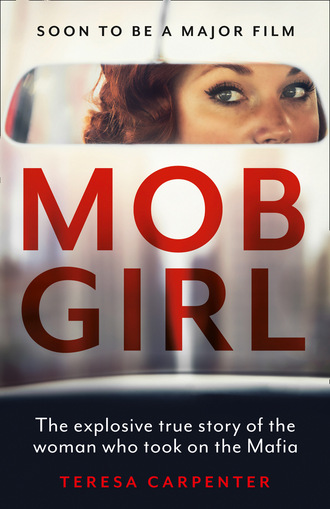
Mob Girl
After Stamey, there was Sal, who owned a bakery shop on the corner. They would go up to his mother’s house in the middle of the afternoon to have sex. Then there was the son of a senator who lived at Knickerbocker Village and whom she met for quick, stand-up sex in the cellar. There were other boys from the Village. There were the boys at the milk bar at Camp Roosevelt. There were boys, boys, boys. By the time she was fourteen, Arlyne had what was politely termed “a reputation.”
On afternoons when they were supposed to be in school, Arlyne and her crew, a clique of Jewish girls named Teddy, Elaine and Hope, hung out on the corner by the K&K Candy Store. Hopie, whose father owned a prosperous bar on the Bowery, was older and drove a red Jaguar. As a result, the girls had the entire city at their disposal. They would go to Little Italy to have their fortunes told. Arlyne was fiercely superstitious and could never resist a palm reader. Then they would drive uptown, heads thrown out the window, hair streaming behind them, shouting taunts at men. In Times Square they would hang out at the hotels, flirting with the band members. Later they would follow the guys to after-hours joints in Harlem, arriving home at two or three in the morning.
Arlyne always had an explanation. She had been out with “the girls.” Irving Weiss tended to accept his daughter’s story because he refused to believe the worst of her. Billie was more skeptical, but with a little artful deception she, too, could be gulled. Before going out for the evening Arlyne would present herself to her mother wearing the most demure skirt and blouse in her closet. Once out the door, she and her chums would drive to a movie theater, and there buy tickets so they could use the restrooms to change into their cruising clothes.
Black satin skirts with high heels were their trademark. Arlyne wore her skirts so tight that she would have to wiggle out of them. Naturally, she could not risk a pantyline, so she dispensed with underwear. Over time her taste in clothing became even more flamboyant as she emulated the photos of showgirls and movie stars. Once she saw the starlet Marilyn Monroe in a pink linen halter dress with coat to match. She had her mother’s seamstress make her an identical outfit. Even on sweltering summer days she paraded down Monroe Street in off-the-shoulder furs, turning every few steps to see who was watching. In her own mind, she was “Stella Stunning,” a teenager’s incoherent ideal of glamour.
And then, Arlyne Weiss discovered Virginia Hill.
Arlyne was not much of a reader. She did, however, make it a point to scan the papers to see what the rich and beautiful were wearing. She happened one day across a photo of Virginia Hill, the fabled beauty who had been the girlfriend of the late Bugsy Siegel. She was wearing a tailored two-piece suit and a large picture-frame hat. Arlyne thought she had never seen a woman with so much class. She was not just a mob girl. She was America’s premier mob girl, and as such she seemed to enjoy the status of royalty. One publication went so far as to call her “the most successful woman in America.”
Miss Hill, it seemed, had clawed her way up from poverty in the finest American tradition. Born in a wretched Alabama steel town, she claimed to have neither worn nor owned a pair of shoes until the age of seventeen—the year she ran away to Chicago, where she found a job waitressing at the 1933 World’s Fair. There she happened to come to the attention of a big-time bookie and gambler who became her lover, financial advisor and ultimately her entree into the fast life of the Chicago Mob.
Virginia’s timing was fortunate. She arrived on the scene just as the Lansky-Lucania crew in New York was linking arms with Capone’s Chicago operation to form a national crime syndicate. That meant the bosses needed some reliable method of getting messages to one another. Talking on the phone was too risky as the wires were frequently tapped. Since most states had statutes making it an offense for two or more known criminals to consort with each other, the racketeers needed a courier who would not arouse suspicion. Who better than a bosomy redhead who was presumed to be some mobster’s brainless girlfriend? There were, after all, dozens who fit that description and law enforcement considered them harmless. In this innocuous guise, Virginia shuttled unmolested between Chicago and New York City.
But Virginia, as it turned out, was neither brainless nor harmless. As one contemporary commentator explained, she was “more than just another set of curves. She had … a good memory, a considerable flair for hole-in-the-corner diplomacy to allay the suspicions of trigger-happy killers and a dual personality, closelipped about essentials and able to chatter freely and apparently foolishly about inconsequentials.” Even the government eventually concluded that she was a “central clearinghouse” for intelligence on organized crime. As such, Virginia enjoyed an independent power base within the Syndicate.
The bosses found other uses for Miss Hill. She became the underworld’s personal emissary to café society. When Virginia arrived on the scene in New York in the late thirties, she contrived a new history for herself, one that would be sure to find its way into the gossip columns. The story circulated that she was a southern society girl who had gone through four rich husbands—all divorced or dead—and she had gotten $1 million from each. Authentic socialites saw through this ruse. Even so, it became fashionable to be seen slumming with her. Virginia made the circuit of Broadway clubs, picking up the check for an entourage of hangers-on and Latin gigolos. It was on one of these nightly swings that she supposedly contrived to meet Joe Adonis, the handsome hood who was later to become the business partner of Irving Weiss. She became Adonis’s girl. And in time, she became Bugsy Siegel’s girl. According to the popular lore of the underworld, it was Adonis himself who unwittingly brought Siegel and Hill together. Virginia carried a note of introduction from Joe to Bugsy, who was then eluding New York authorities in Los Angeles. The attraction was immediate and mutual. Although Virginia tried to placate both lovers by flying from coast to coast, she finally settled into Beverly Hills with Bugsy, whom she preferred to call “Ben.”
Virginia cut as flamboyant a figure in Hollywood as she had in New York. She and Siegel gave fabulous parties attended by celebrities like George Raft who were perversely flattered to be courted by a mobster and his moll. When Meyer Lansky ordered Siegel to open up Nevada for gambling, Virginia and Ben took their road show to Las Vegas to oversee the construction of the fabulous Flamingo Hotel. It was there that Virginia’s fairy tale career hit the skids. Bugsy was no businessman and he plowed the most expensive materials into the hotel without regard to cost. The overruns infuriated his Syndicate backers in New York and Cincinnati, particularly when rumors began circulating that he and Virginia were skimming construction dollars and socking them away in a Swiss bank account.
On June 16, 1947, Virginia Hill took an unannounced trip to Paris. Four days later, as Bugsy was sitting on the couch in Virginia’s Beverly Hills home, he was killed by the blast of a .30 caliber carbine fired through the living-room window. During the months thereafter, rumors concerning Virginia Hill’s role in the Siegel hit proliferated wildly. One school of thought held that Virginia knew Bugsy was in deep trouble and had flown to Europe to plead for his life, the reasoning being that she could place a call from Paris to Lucky Luciano, then in Italy, without worrying about her line being tapped. More cynical speculation held that she knew Bugsy’s days were numbered and simply wanted to be out of the line of fire.
After Siegel’s death Virginia made a series of highly publicized suicide attempts. These too admitted alternative interpretations. Sentimentalists concluded that she was undone by grief. Others professed that Virginia took just enough pills to make her attempts at suicide appear serious; that she kept a safe deposit box in which lay a packet addressed to the district attorney of L.A. County. That this packet contained evidence that could send ten Syndicate bosses to the chair for Siegel’s murder. That the document was supposedly to be delivered in the event of Virginia’s death. That after each suicide attempt she received a substantial payment from the Syndicate to assure her continued good health.
Four years later, the Kefauver Committee would call Virginia, whom it hoped might be sufficiently grieved by Bugsy’s death to divulge the names of his killers. They were mistaken. Virginia was unshakable. She claimed to know few of the men about whom the committee was inquiring. She knew nothing about the source of Bugsy’s money, had never heard of his being involved in any illegal activity, and seemed not to care one whit who had killed him. As far as she was concerned all of Bugsy’s friends were “perfect gentlemen.”
Virginia Hill made it clear to a nation of fascinated onlookers that a mob girl was no rat.
Arlyne was enthralled. Every day she combed the papers for some new shred of gossip about Virginia. “In my eyes,” she would later recall, “here was a broad that really made it good.” Here was a woman who had clothes, money and all the attention any human could hope for. Not only was she widely admired as a sex goddess but she seemed to enjoy respect as well. What impressed Arlyne most deeply was that Virginia Hill had been admitted into the bosses’ confidence. She had been accepted as one of the boys.
As a practical matter, Arlyne Weiss, the pampered racketeer’s brat, did not enjoy much in common with the young Virginia Hill, barefoot ’til the age of seventeen. Nonetheless, Arlyne felt a curious kinship with her. There were certain aspects of Virginia’s career that reminded her of Ida Blum, a sort of mob girl in her own right. Like Virginia, Arlyne’s adored grandmother enjoyed beautiful clothes and was always surrounded by men who admitted her to their private counsel. Not that Arlyne ever thought of her grandmother as a common mobster’s moll. She was a lady. But so in some strange way was Virginia. She was half tomboy, half whore, but always a lady. And that, Arlyne Weiss decided, was what she wanted to be. At the age of fourteen, she set out to become a mob girl.
The stylistic considerations were easiest to effect. Arlyne retired her Marilyn Monroe imitations and instructed the seamstress to make her a set of form-fitting two-piece suits, which she wore with a picture-frame hat. Although Virginia Hill’s hair was a bright red, Arlyne never saw anything but black-and-white photos, in which it looked dark. Acting on this misconception, she dyed her own hair jet black. When the physical transformation was complete, she set about cultivating the one thing that distinguished Virginia most. Fast company.
Arlyne had always been attracted to “dangerous” men. Men like Joe Adonis who emanated a seductive aura of menace and power. Curiously, she did not find that quality present among the Jewish racketeers in her father’s circle. It was certainly well known that individuals like Izzy Smith or Red Levine had the ability to pick up the phone and get someone killed. In the wisdom of her mature years, she would conclude that Jewish racketeers had more class than the Italian wiseguys. They certainly dressed better and they weren’t always trying to kill one another off. But there was a certain sterility in the way they wielded their power—like executives. It was the Italians with their pretty-boy looks and passionate vendettas who attracted Arlyne. When a wiseguy was dangerous, he was truly dangerous.
The streets around Knickerbocker Village abounded with wiseguys, some of them made men, and others just punks in their Danny Anfang shirts and Benedetti shoes aspiring to membership in a local neighborhood crew. Arlyne and her girlfriends had considerable experience flirting with the punks, as one stop of their nightly circuit was likely to be Sullivan Street, where Italian boys congregated on the street by a church. Hopie would slow the Jaguar to a crawl, giving the girls, who had shoved their upper bodies out the window, an ample opportunity to flaunt their bosoms. The Italians proved to be easily aroused, but when they ventured close to the car Hopie sped away.
Teasing punks was one thing, going out with them another. These were not the sort of hoodlums who would meet Virginia Hill’s high standards. And Arlyne had resolved to go after only those wiseguys who had made a name. At the top of her list of prospective conquests was Tony Mirra.
Arlyne was around fourteen when she first noticed Tony. He was much older, his jet-black hair already beginning to show the white streak that would become his distinguishing trait. Tony’s midriff was already beginning to expand, a fate that seemed universally to befall wiseguys once they reached the age of twenty-five. But Arlyne found him “gorgeous.” As with Joe Adonis, his dark good looks and commanding manner reminded her of her father.
Tony lived near Knickerbocker Village on Monroe Street with his old Italian mother, to whom he was passionately devoted. That filial solicitude stood out in sharp contrast to Tony’s widely held reputation as a sexual brute. It was not uncommon for Tony, while cruising through the neighborhood, to pick up an attractive woman, nail her in the back seat and then push her out of the car. Tony was, furthermole, reputed to be an enforcer for the Bonanno crime family. She heard he was a bodyguard for a very big boss, she didn’t know who. But he was definitely dangerous.
Tony’s path had crossed the Weisses’ at only one point, when he had come to Chester Motors with his uncle, Al Walker, looking for a car. They bought a black Cadillac with yellow doors. Irving had acquired it from the owner of a liquor store who had had signs hanging from the sides. Arlyne found the choice a little odd, but Tony and his uncle Al loved their two-tone Caddy. They drove it all around the Lower East Side. Wherever Arlyne saw it parked, she knew Tony could not be far away.
On most afternoons, Tony parked the Cadillac on Madison Street in front of one of his favorite watering holes, the Black Horse Saloon. He usually came there to conduct some unspecified business with two union officials. They would hang around on the street outside the bar’s blue door before going inside to eat. Having noted this routine, Arlyne embarked on a campaign to get Tony’s attention. Donning her Virginia Hill garb, she would strut majestically down Madison on the pretext of visiting Savarese’s corner drugstore. If her timing was good, she would catch Tony outside, in which case she would stop dead cold in front of him, turn slightly and give him a seductive glance from beneath the picture-frame hat.
For weeks, all she got for her trouble was indifference. Tony Mirra was simply not impressed by a fourteen-year-old dolled up like a high-class hooker. At length, Arlyne abandoned this tack in favor of a more direct approach. Enlisting Hopie’s company for moral support, she took her usual tour down Madison one afternoon, but instead of continuing to the corner, she stopped before the blue door and, grabbing the handle resolutely, opened it and marched inside. The Black Horse was dim, even with the late-afternoon light streaming through its street-front window. When her eyes adjusted to the darkness, she scanned the length of the bar but failed to find Tony. Finally, she spotted him sitting at a table in the back with a union official having a plate of pasta.
“Come on over here, kid,” Tony called. “I wanna talk to ya.”
Thrilled at finally having attracted his attention, Arlyne steered Hopie toward Tony’s friend and took a place beside Mirra. But things did not unfold as she had hoped. She had envisioned herself impressing Tony with her tough talk, then maybe he’d take her out to dinner where she could be seen with him. Just being seen with Tony Mirra was an honor in those days. But Tony had other things on his mind. Without warning, he began playing with her, feeling around her waist, thighs and breasts. Caught off guard she complained, but in fact she found herself becoming excited. It was rush hour when Tony took her out for a ride. He drove for a while then pulled over next to the Journal-American building on South Street and started to unzip his pants. “Tony, I can’t do that,” Arlyne objected, keeping a nervous eye on the stream of people exiting from the Journal.
“C’mon. I wanna show you how to do something,” he said. And with that he grabbed her by her long dark hair and pushed her face toward his penis. When she resisted, he slapped her, growling, “You’re nuthin’ but a cockteaser.” It was then that Arlyne allowed herself to be instructed in the art of oral sex. Tony taught her how to hold it and how to rub it up and down. She found the whole process revolting, but at that moment, nothing in the world seemed so important as pleasing Tony Mirra.
Afterward, Tony dropped her back on Monroe Street as if nothing had happened, leaving her stung by his indifference. When the hurt passed, she became angry and her anger took the form of a renewed assault. Every day after that she showed up at the Black Horse wearing the tightest outfits she owned. If Tony wanted to feel her up, she offered no resistance. If he wanted to take a ride and park, she accepted docilely. It was not, she imagined, how Virginia Hill had done it—or maybe she had. But Arlyne felt this was all a necessary part of becoming a true-to-life mob girl. Tony, in turn, allowed her the privilege of being seen with him. She was allowed to come into the Black Horse when Tony wasn’t talking business. And if he was really feeling generous he would take her for a ride in the two-tone Caddy with his uncle Al Walker and cousin, Angelo. Tony, Arlyne would later recall, became her “protector.” If she ever needed money, she could get it from him. If she found herself in a situation she couldn’t handle at two in the morning, she called Tony and he’d send someone over to pick her up. In return, she ran errands for him. The nature and purpose of these errands were never explained. Tony would simply give her a sealed envelope, which she surmised contained cash—or sometimes a larger packet of undisclosed contents—and she would deliver it to one of his friends across town. Whenever duty called, she would dress to the hilt, always wearing a fox stole off the shoulder, Virginialike. She was thrilled that Tony trusted her with his business. It made her feel important.
Arlyne knew that her parents would definitely not approve of Tony, which, of course, was part of his charm. She enjoyed provoking her mother by arriving home at three in the morning. Even at that hour, there was no way Arlyne could make it to her bedroom unobserved, since Billie would be waiting on the couch in the foyer. She would never know for sure where Arlyne had been, but she was sure she had been up to no good. And as soon as she heard the door close, she began screaming, “You tramp! I’ve never had a good day with you. I’ve never had anything right with you.” Billie screamed until the muscles on her neck stood out. Arlyne would just smile and say, “Hit me.” After Billie landed a blow, Arlyne would turn and walk into her own room.
During these brawls, Irving Weiss would not leave his bedroom. And in the morning he would never let on that anything out of the ordinary had occurred. He was a man who saw only what he wanted to see. And for a long time, he turned a blind eye to Arlyne’s relationship with Tony Mirra. One evening, Arlyne told her father she was going out with a Jewish boy and instead went drinking with Tony at a Chinese restaurant called the House of Chan. When Tony dropped her off in front of her house at five in the morning, Irving was waiting. He had recognized the black-and-yellow Cadillac. That night Irving Weiss gave his daughter a beating. It was the first of only two times Arlyne could ever recall her father raising his hand to her.
The Weisses concluded that Arlyne’s wildness was attributable to the influence of the Lower East Side. Billie wanted find a “better environment,” someplace where her daughters could grow up to be ladies. For several years, other families—both proper citizens and racketeers with yearnings toward respectability—had been moving out of the old neighborhood. If they had any money at all they settled across the East River in the borough of Queens. This exodus further hastened the decline of the Jewish quarter. East Broadway began looking neglected. Grocers, milliners, haberdashers and family restaurants went out of business. Even Blum and Oxman suffered when the Clinton Street Boys found another hangout in Queens.
When Arlyne was sixteen, the Weisses joined the exodus, moving to a posh second-floor apartment in the relatively stylish residential neighborhood of Forest Hills. But a “better environment” did not have the desired effect upon Arlyne Weiss. Despite the fact that she was now cut off from Hopie, Elaine, Teddy, Tony and the entire Monroe Street crew, she had a gift for finding bad company. In Forest Hills, she found Sophie.
Sophie was a pretty little girl with bright red hair, which she wore in a flip like Hedy Lamarr. It was always so perfect it looked like a wig. Her father, an Eastern European Jew, owned a neighborhood grocery. But he was sufficiently prosperous that he could afford to indulge his only daughter. Sophie was spoiled and lazy. Arlyne found in her a highly congenial companion.
Like Arlyne, Sophie cut school routinely. Every day Sophie would sleep until noon. Then around two o’clock she would get into a cab, swing by to pick up Arlyne, and the two would set out to make mischief. Largely through Arlyne’s reconnoitering, they discovered the Carlton Terrace, a shady bar on Queens Boulevard, which served as the new hangout for the Clinton Street Boys. At any hour of the day you could walk into the Terrace’s dark interior and find the old crowd from Ida’s place and several other faces as well, including that of a union official named Moishe.
In the Blum and Oxman days, these had been The Uncles, who had given Arlyne quarters and affectionate tweaks. At the Carlton Terrace, however, they were usually in the company of women who were definitely not their wives. And when Arlyne and Sophie walked in like a couple of molls, they were greeted with lustful glances. During the ensuing seductions Arlyne managed to sleep with Moishe (whom she knew to be one of her father’s friends). Sophie slept with a handful of her own. The girls enjoyed picking these old men off for the sheer sport of it.
Some afternoons, they would not go out at all. Sophie came to Arlyne’s house. (Irving would be at work, Barbara at school and Billie off playing Mah-Jongg.) They turned on the television and if they saw a handsome celebrity, they would try to reach him by phone with the intent of seducing him. These overtures were usually unavailing. One day, however, while watching a rodeo, they saw a bronco buster named Casey Tibbs. Arlyne turned to Sophie and said, “I’ll bet we can get to this sonofabitch.” With that she dialed Madison Square Garden and told them it was an emergency and she needed to reach Mr. Tibbs. When she got Casey on the line, she proceeded without much prologue to describe the things she would do to him if he visited her in Forest Hills. The next morning he sent her a dozen red roses.
Casey went on the road, and over the next few months they talked a lot on the phone. When, finally, he returned to New York, Arlyne put on her silk sheath and went to meet him at his hotel. When he opened the door, she was crestfallen. However handsome Casey looked on a bucking bronc, in the flesh he was just a broken-down old cowboy. When he took her to a steak house, she was embarrassed by his cowboy clothes and the gaudy championship belt buckle that sagged around his thin waist. That night she and Casey had quick sex, and she fled to Forest Hills.
Other than this fleeting contact with celebrity, Arlyne wasn’t meeting the type of big-name big spenders with whom an aspiring mob girl could hope to make a reputation. What she lacked was some grand stage on which to play out her role. Then, almost by chance, Arlyne discovered an entree into the world of prizefighting.









